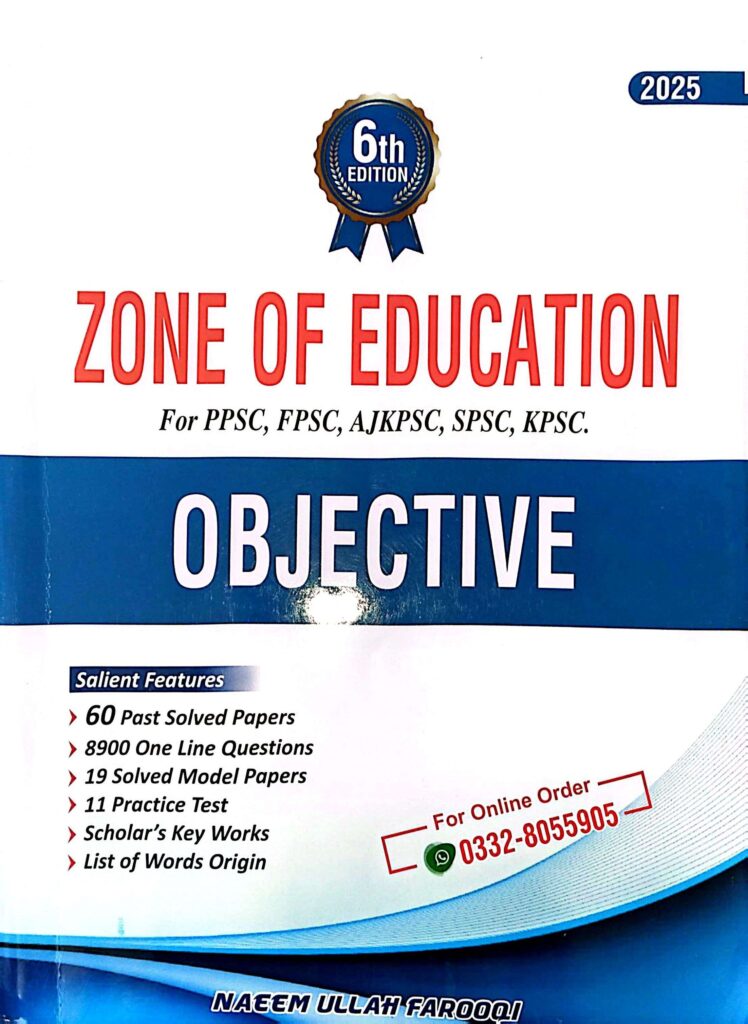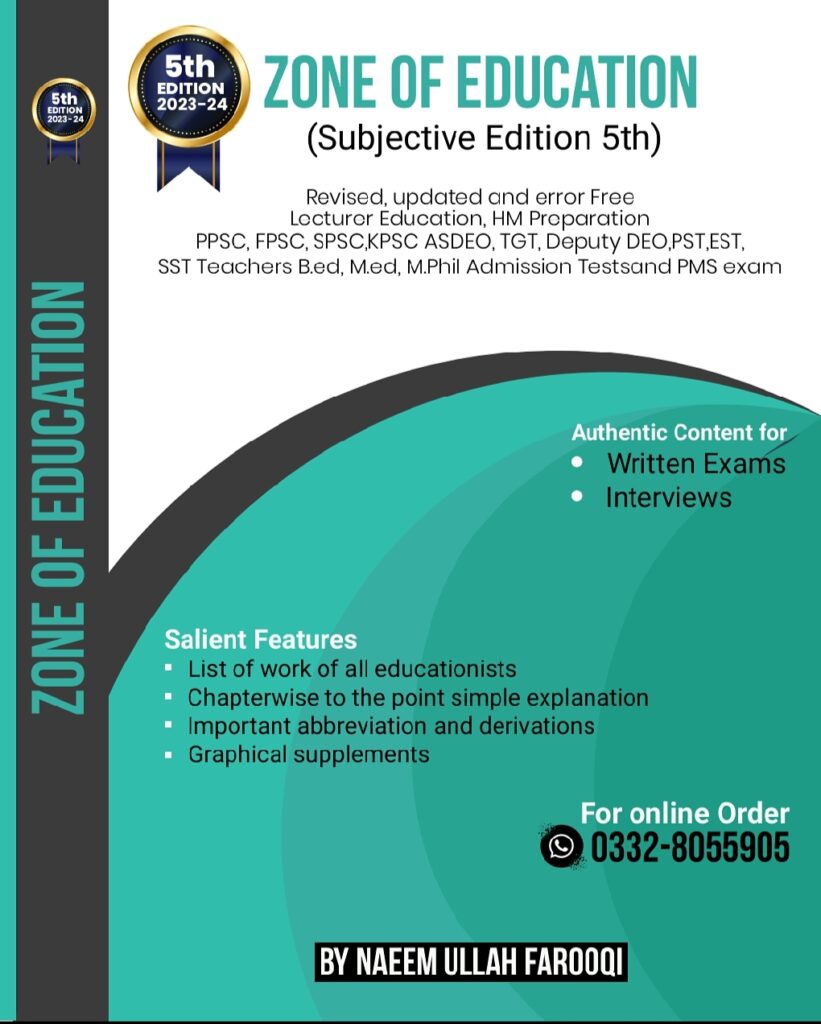GENERAL METHODS OF TEACHING
Which of the following is not a defect of our examination system?
(a) Examination assess only rote memory
(b) Ignores creative abilities
(c) Continuous and comprehensive evaluation system
(d) Over emphasis to written examination
Ans. Continuous and comprehensive evaluation system
3. A programme organised for the drop-outs and working class people to secure a university degree through non-formal agencies of education.
(a)Continuing education
(b)Populaion education
(c)Compensatory education
(d)Modernisation
Ans. Continuing education
4. The development of a student’s personality is affected the most by __________.
(a) Discipline at institute
(b) Emotional climate at home
(c) Inherited assets and liabilities
(d) Social orientation of peers and elders
And: Emotional climate at home
5. Which of the following is the main cause of indiscipline in schools?
(a)Over crowded classroom
(b)Lack of good administration
(c)Cruel punishments
(d)All the above
Ans. All the above
6. Adult education should be under the authority of:
(a)Non government organisation
(b)Private sector
(c)Educated persons
(d)Government
Ans. Non government organisation
7. Teaching aids are useful for classroom instruction for:
(a)Making teaching within understanding level
(b)The sake of its use
(c)None of these
(d)Reducing verbalism
Ans. Making teaching within understanding level
8. Which of the following situations would the best for maximum transfer of learning?
(a) Different tasks requiring different responses
(b) Different tasks requiring the same response
(c) Similar tasks requiring different responses
(d) Similar tasks requiring the same response
And: Different tasks that require the same response
9. Creativity in the classroom can be promoted by:
(a)Giving creativity exercises
(b)Giving rewards for new ideas
(c)Identifying creative children
(d)All the above
Ans. All the above
10. Educational psychology is oriented towards:
(a)The application of the principles and techniques ofpsychology to the solution of the problems of the class room
(b)The definition of goals for which the teacher should strive
(c)The identification of potentially successful educational procedure
(d)The study of the peculiarities of indivdual children
Ans. The application of the principles and techniques ofpsychology to the solution of the problems of the class room
11. Which one of the following is the most important elements in teaching?
(a) Relationship between teachers and students
(b) Subject matter
(c) Teaching techniques and aids used
(d) Student’s knowledge
And: Relationship between teachers and students
12. The capacity to think rationally and act purposefully is:
(a)Perception
(b)Intelligence
(c)Reasoning
(d)Creativity
Ans. Intelligence
13. If students do not understand what is taught in the classroom, the teacher should feel,
(a)Terribly bored
(b)To explain it in a different way
(c)That he is wasting time
(d)Pity for the students
Ans. To explain it in a different way
14. Which of the following provides more freedom to the learner to interact?
(a)Large group discussion
(b)Seminar
(c)Lecture by experts
(d)Small group discussion
Ans. Small group discussion
15. To make learning effective, a goal must be meaningful in terms ______ ?
(a) Objectives of the curriculum
(b) Intellectual ideas
(c) Standards of others
(d) The needs and purposes of students
And: The needs and purposes of students
16. “Education is life, not a preparation for life”. This statement summarizes one important aspect of the educational philosophy of:
(a)Rousseau
(b)Herbart
(c)Froebel
(d)John Dewey
Ans. John Dewey
17. Which of the following items of information are important about students to motivate them for studies?
(a) Learning style
(b) Personality
(c) Socio-cultural background
(d) All of the above
And: All of the above
18. KER means:
(a)Kendra Education Rules
(b)Kerala Educational Regulation
(c)Kendra Editors Rules
(d)Kerala Education Rules
Ans. Kerala Education Rules
19. ________ is the process in which you identify the common aspects or basic relationships in a variety of specific situations?
(a) Abstraction
(b) Generalization
(c) Problem Solving
(d) Reasoning
And: Generalization
20. ‘Main streaming’ is a term associated with:
(a)Environment education
(b)Education for the handicapped
(c)Interage class grouping
(d)Career education
Ans. Education for the handicapped
21. The first important step in teaching is:
(a)Organising material to be taught
(b)Knowing the background of students
(c)None of these
(d)Planning before hand
Ans. Knowing the background of students
22. You want to develop cooperation and team spirit in students? Which activities would you propose?
(a) Art
(b) Debate
(c) Project work
(d) Quiz
And: Project work
23. A child who is in the habit of stealing is to be dealt with:
(a)Punishment
(b)Scolding
(c)Counselling
(d)None of the above
Ans. Counselling
24 . Why do teachers use teaching aid?
(a).For students’ attention
(b).To make teaching fun-filled
(c).To make students attentive
(d).To teach within understanding level of students
Ans: To teach within understanding level of students
25. Which characteristics from the following is least connected with a teacher?
(a)Command over subject matter
(b)Command respect from political leaders
(c)Effective verbal communication
(d)Good rapport with the students
Ans. Command respect from political leaders
26. “Stress should be laid on principle of Co-operative activity, flowing accuracy, initiative and individualresponsibilty in learning” has been stated by:
(a)Gandhiji
(b)Tagore
(c)Aurobindo
(d)Nehru
Ans. Gandhiji
27. A good teacher must be
(a).resourceful and dominant
(b).resourceful and autocratic
(c).resourceful and authoritative
(d).resourceful and participative
Ans: resourceful and participative
28. A student raises questions in the classroom. The teacher should:
(a)Scold him for disturbing the whole class
(b)Advise him to learn well
(c)Appraise him and do answer to his question
(d)Pay no attention
Ans. Appraise him and do answer to his question
29. Which one is the highest order of learning?
(a).Chain learning
(b).Problem-solving learning
(c).Conditioned-reflex learning
(d).Stimulus-response learning
Ans: Conditioned-reflex learning
30. A free democratic classroom will be best suited for:
(a)Children who lacks emotional security
(b)Children from authoritarian homes
(c)Children being trained to become free citizen
(d)Children with strong need for guidance
Ans. Children being trained to become free citizen
JOIN ZONE OF EDUCATIONPK!
Discover the most comprehensive and reliable pedagogy resources in Pakistan, curated for competitive exam success. Our content covers all competitive exam MCQs, including PPSC, FPSC, AJKPSC, SPSC, and more. Designed to empower learners with top-notch material and insights, trust us for your preparation journey!


